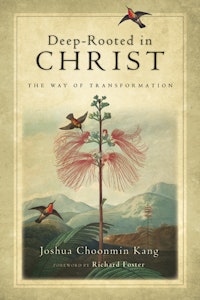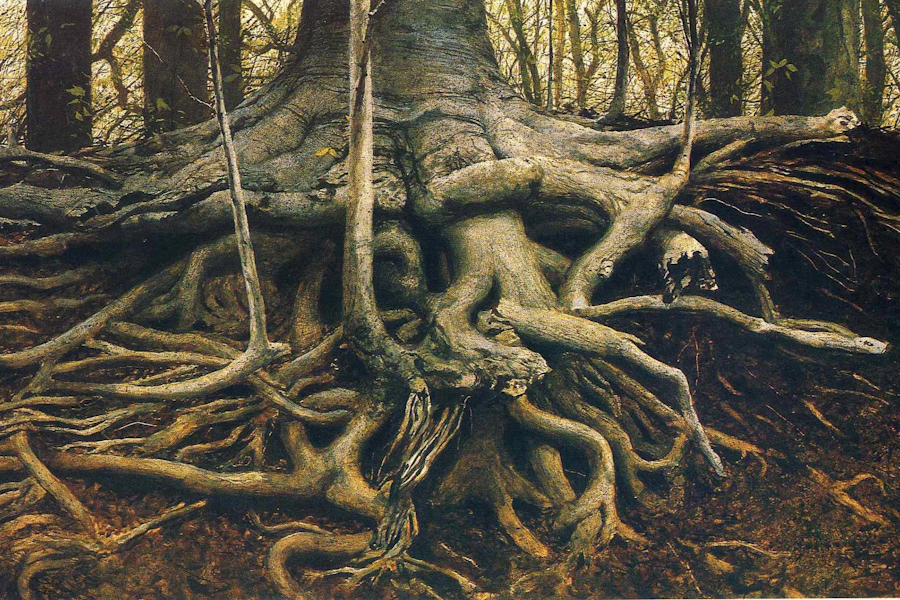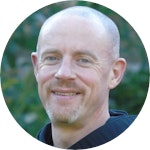Introductory Note:
How delightful it is to listen in on two spiritual formation authors as they discuss their love and appreciation for a third! Enjoy this vintage conversation between Richard Foster and Chris Webb.
Renovaré Team
 Excerpt from Deep-Rooted in Christ
Excerpt from Deep-Rooted in Christ
This is an excerpt from January 21, 2008’s issue of Richard Foster’s Heart-to-Heart Pastoral Letter. Herein, he and Chris Webb discuss Deep-Rooted in Christ: The Way of Transformation by Joshua Choonmin Kang. Richard wrote, “We feel Deep-Rooted is the closest kind of writing in our day to Thomas à Kempis and his Imitation of Christ. So we have decided to carry on a little dialogue about this book and you can listen in.”
Richard: One thing that impresses me about Deep-Rooted is its quiet confidence. I find this quality also in Pastor Kang as a person, and it certainly spills over into the book. This is such an unusual quality in our day. So many people are either tentative and fearful or they are bombastic and overly self-assured. It is a rare joy to find a writing that is clear and concise from a person who is meek and humble of heart.
Chris: I agree. And it’s noticeable that the book overflows with a sense of grace, which I’m sure is the wellspring of this confidence. It’s clear that the life Pastor Kang describes flows out of a response to God’s gracious invitation; it’s unforced, not a self-willed initiative. As he says in Chapter 16: “Spiritual discipline is all about practicing the will that God has put into our hearts.” He’s gently teaching us to allow God to take the lead rather than trying to pummel ourselves into holiness.
Richard: Exactly. At one point Pastor Kang writes, “The deadliest disease of contemporary life is impatience … there’s one thing we can’t achieve overnight: the discipline of righteousness.” I find this so true in myself. I’m always wanting to be heroic in the spiritual life. This was acutely true of my early years of ministry: always taking on more than was good and right; always trying for sainthood overnight. Chris, any thoughts on how we can begin to tackle this “deadliest disease”?
Chris: Unfortunately, I’m usually too busy striving for spiritual greatness too, so I can’t claim to be a master of the virtue of patience! Perhaps the key discipline so many of us need is sabbath. God says, “Be holy, for I, the Lord your God, am holy” (Lev 19:2). But an essential part of that journey to holiness is bringing our frenetic activity on God’s behalf to a halt, and opening up time for him to act directly. Of course, that means relinquishing control over the process, which is hard for all of us. This is where the series of chapters in Deep-Rooted on waiting and anticipation can be so helpful.
Richard: Absolutely. This matter of waiting and surrendering control to God are right at the heart of our deepest needs. It reminds me of an experience I had in learning “Sabbath Prayer.” Can I share it with you?
Chris: By all means, share away!
Richard: Well, I was on a small island off the pacific coast of Canada with a group of Christian leaders. During a morning break period I found a canoe and paddled over to a tiny island. Beaching the canoe I began exploring the fir-covered crest. When I reached the crown of the island I discovered a small wooden platform someone had built and a weathered wicker chair which sat atop it like a lonely sentinel.
Easing myself into the chair I sat back into the warm sun light and drank in the stillness of land and sea and sky. Now, I did not paddle over to this lovely spot to pray, only to explore. Sitting there, however, I recalled Carolynn’s goodbye words to me at the airport: “I want you to come home refreshed!” Soon I found myself praying simply, “Refresh me, Lord. Refresh me.” What next surfaced to my mind was, “I want to teach you Sabbath Prayer.” I leaned forward in anticipation, though I was far from sure what “Sabbath Prayer” meant. “You will have to guide me because I don’t know what I am supposed to do,” I responded. Then came three words, the first a command: “Be still … Rest … Shalom.” That was all. Three words and no more. For some moments I sought to enter into the experience of each word.
The encounter was wonderful, but I was also aware that time was slipping by. I became concerned. “It’s nearly noon. People will begin to miss me and wonder why I’ve stayed here so long. I’d better get back for lunch.” The same three words were spoken over me: “Be still … Rest … Shalom.” They seemed to calm my spirit, and I returned to a quiet attentiveness.
After a while, however, my mind became agitated by a kind of hyper-responsibility because I founded the group. “The next session will begin soon,” I reasoned. “I need to be there. What kind of example will my truancy make. Besides, everyone will really begin to be concerned about my absence.” The same three words came into my mind: “Be still … Rest … Shalom.”
The final temptation, however, was the most alluring. I began thinking to myself, “This experience is absolutely wonderful. I must capture this moment for the future. But how? I cannot possibly remember everything that is happening to me? Where is some paper? I must write it all down!” Again: “Be still … Rest … Shalom.” All the more focused I settled back into Sabbath Prayer. In a short time it seemed like “the Presence in the midst” ended, and so I made my way back to the group which hadn’t even missed my absence and were going right on with the day’s schedule! So, I guess I still have a lot to learn about waiting and letting go and sabbath.
Chris: Another truly impressive characteristic of this book is Pastor Kang’s refusal to avoid the inherent difficulties and struggles of the spiritual life. At one point he boldly reframed “solitude” as a profound loneliness before God, and in another chapter he spoke of the “discipline of self-shattering.” Towards the end of the book he reminds us that Jesus calls us to an abundant life, “not the comfortable life.” My feeling is that in many British churches that’s not a welcome message; as one clergy friend of mine once lamented, people love the “Hosannas” of Palm Sunday and the “Hallelujahs” of Easter Day, but would rather avoid the Good Friday cross that lies between them. Am I right in sensing that is also true here in the States?
Richard: Oh, yes. I imagine it is a universal human condition to want the “Hosannas” and the “Hallelujahs” without the cross of Good Friday. It reminds me of the trenchant words of William Penn, “No pain, no palm;\ No thorns, no throne;\ No gall, no glory;\ No cross, no crown.” The pain and the thorns and the gall and the cross are simply part of what it means to enroll in what Pastor Kang calls “the school of the wilderness.” It is a rugged discipleship we enter when we follow Jesus. There simply is no other way. And yet, right in the midst of all such painful realities there is also the palm and the throne and the glory and the crown.
Chris: It was lovely to see such an emphasis on wisdom in Deep-Rooted; in Chapter 14, for example, Pastor Kang writes that “mature Christian faith involves the marriage of belief and wisdom.” I really appreciated his highlighting the need for this loving and gracious discernment about how best to live and share our walk with Christ. It stands in refreshing contrast to the tendency I too often encounter where people are very well informed about Scripture and doctrine, but seeming less able to find a gracious and loving way to express it!
Following Pastor Kang’s gentle guidance might perhaps lead to a little less strident dogmatism and encourage a little more spiritual dynamism.
Richard: You are so right, Chris. The Bible was not given to us just so we can know the fine points between infralapsarianism and supralapsarianism but for “teaching, for reproof, for correction, and for training in righteousness” so that we may become “equipped for every good work” (2 Tim 3:16 – 17).
Chris: If I had to pick out one aspect of this book that will probably stay in my mind for some time, it’s Pastor Kang’s uncompromising clarity about our purpose and calling. We don’t practice the disciplines to become spiritual giants, holy men and women of renown. We’re not on some sacred self-improvement program. Instead, “Jesus is the goal for all believers.” Our aim is to so crucify ourselves that Christ can live in and through us – a calling to death before resurrection – which is perhaps why Deep-Rooted opens with some very courageous and uncomfortable words: “Begin with emptiness.” We’re so often encouraged to be filled, to be blessed, to receive all we can from God. I think it’s a hallmark of Pastor Kang’s gospel-grounded teaching that he draws us back instead to self-sacrifice, to renunciation, to the cross. But that’s very hard in practice, don’t you think?
Richard: Yes, it is hard… sometimes even hard unto death. But then, this call to discipleship to Jesus isn’t our project. To be sure, we take up our cross to follow him, but the minute we do we discover it is transformed into “the light burden” and “the easy yoke” which Christ promised. Jesus really is with us, shouldering the burden with us, bearing the yoke with us. And he will show us how to live our lives as he would live our lives if he were we. This is the joy in Jesus’s call to discipleship. He is with us even to the end of the age.
Well, our space is just about gone. Perhaps it would be good to close our conversation with some thoughts from Pastor Kang himself.
Chris: Indeed!
“I live in two worlds, the East and the West. I communicate in two languages, the one Eastern, the other Western. I also have two streams of spirituality flowing within me, Asian and American.
While living in two worlds that are often at odds with each other, I’ve learned how to bring harmony out of conflict. Inevitably, the meeting point, the balancing point, the unifying point is Jesus Christ. Jesus Christ is the language in which the East and the West converse. He is the Lord of all things. He is the Creator of the heavens and earth with his Word. He is the Way, the Truth, and the Life.”
“How shall we describe the life of a Christlike person? Such a life sets a goal and imitates Jesus in a lifelong process by and in the grace of God.”
“With this book I’d like to invite you into the deeper life that is rooted in Jesus. Pursuing depth takes little enough effort, but it will eventually lead us to a very genuine and very deep inner world.”
“It is my prayer that as you read this book you will become a person who pursues character before success, integrity before popularity, maturity before growth and service to others before accomplishment in your own life.”
— Joshua Choonmin Kang 1
- Joshua Choonmin Kang, Deep-Rooted in Christ (Downers Grove, IL: InterVarsity Press, 2007), pp. 15 – 17. ↩︎
Image credit: Roots by Jamie Wyeth, 1971. Fair use.
Text First Published January 2008 · Last Featured on Renovare.org February 2024



